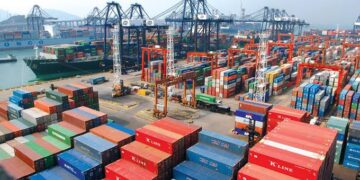Revenue from Nigeria’s manufacturing export has plunged from ₦2.trn to ₦778.4bn, representing 166 per cent shortfalls.
The figure was contained in a report published by World Bank Africa Pulse report seen by Daily Intel Newspaper.
The report said the downward trend did not abate since setting in in 2019, and plummet to ₦960.7bn due to COVID-19 in 2020.
Although, there was an insignificant recovery in 2021 of ₦1.15trn, in 2022 , Nigeria’s export recorded a huge drop to ₦781.1bn and ₦778.4bn in 2023, the report established.
The Bank which blamed Nigeria’s dwindling foreign trade on poor infrastructure and inefficient logistics, among other factors, said that the cost of trade in Nigeria and Ethiopia is four to five times higher than what is obtained in the United States due to insecurity, higher transportation costs, topography and poor road infrastructure.
“Studies from the Africa region consistently find spatial differences in prices of imported goods (food and non-food) as well as non-traded agricultural staples, indicating that markets are not well-integrated, and retail prices of products are affected by distance.
“For instance, trade costs are four to five times higher in Ethiopia and Nigeria than in the United States, due to poor road infrastructure, low competition in the transportation sector, and topography,”
The report further noted that the consequences of these distortions, include preference of African producers to sell locally rather than export.
Channels reported that manufacturers and operators in the export ecosystem have lamented that the harsh business environment in the country is making local products uncompetitive globally.
The bank’s report comes after the Nigerian Export Promotion Council ,NEPC, charged Nigerian exporters to adhere to the requirements for exporting products to different countries.
Speaking at a recent sensitisation workshop aimed at enhancing Nigeria’s export potential and strengthening trade relations with China, Executive Director of NEPC, Nonye Ayeni, emphasised the need for exporters to adhere to the General Administration of Chinese Customs (GACC).
Ayeni, who was represented by the North-Central Coordinator of the council, Samson Idowu, said that GACC has clear but stringent requirements for exporting products to China.
“Understanding the registration process, documentation and regulatory changes is paramount for successful export. Understanding the requirements set forth by GACC is crucial for Nigerian exporters to ensure smooth and successful trade with China,” she stated.















































